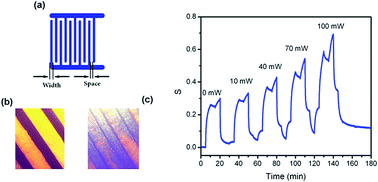Effect of laser irradiation on CO gas detecting response of reduced graphene oxide sensor
Abstract
The effect of laser irradiation on the performance of a carbon monoxide gas sensor was investigated in this paper. We used a facile fabrication method to make the sensor using a graphene oxide suspension. For this purpose, graphene oxide was prepared, and the sensor was fabricated by drop-casting its suspension onto the interdigital circuit surface. Then, the graphene oxide layer was reduced by an applied DC electric field. The fabricated sensor was evaluated systematically in terms of its response and selectivity toward CO gas molecules. The effect of humidity on the fabricated sensor was also investigated in this work. Post-fabrication modification by a laser beam was successfully employed for the in situ laser induced improvement of the detecting performance of the gas sensor. The electrical conductivity and gas-sensing characteristics of the sensor were studied, and the results demonstrated a strong dependence on the power and wavelength of the laser beam. It is shown that the sensing response of the sample irradiated by laser light is higher and faster than the samples without laser irradiation.


 Please wait while we load your content...
Please wait while we load your content...